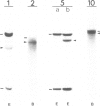Abstract
Ten cases of angioimmunoblastic lymphadenopathy with dysproteinemia (AILD) and AILD-like lymphoma were studied by immunophenotypic and immunogenotypic analysis. All specimens were found to have a predominance of T cells by immunophenotypic analysis. DNA hybridization analyses showed three of five specimens of AILD and five of six specimens of AILD-like lymphoma to contain clonal rearrangements of the beta T-cell receptor gene. No rearrangements of the heavy or light chain immunoglobulin genes were seen in any case. A single case showed a progression of AILD with a germ-line pattern of beta T-cell receptor DNA to AILD-like lymphoma with detectable clonal rearrangements for beta T-cell receptor DNA. These results suggest that many, but not all, cases diagnosed histologically as AILD or AILD-like lymphoma contain a clonal proliferation of T-lymphocytes.
Full text
PDF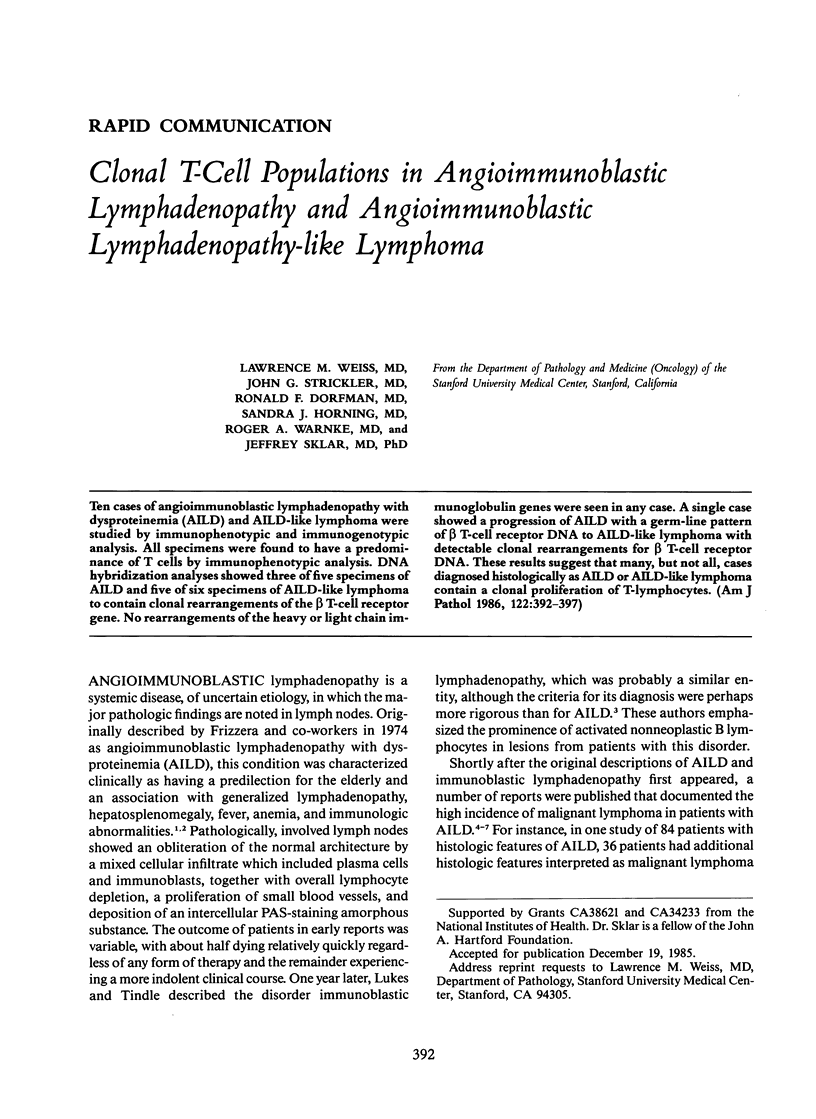
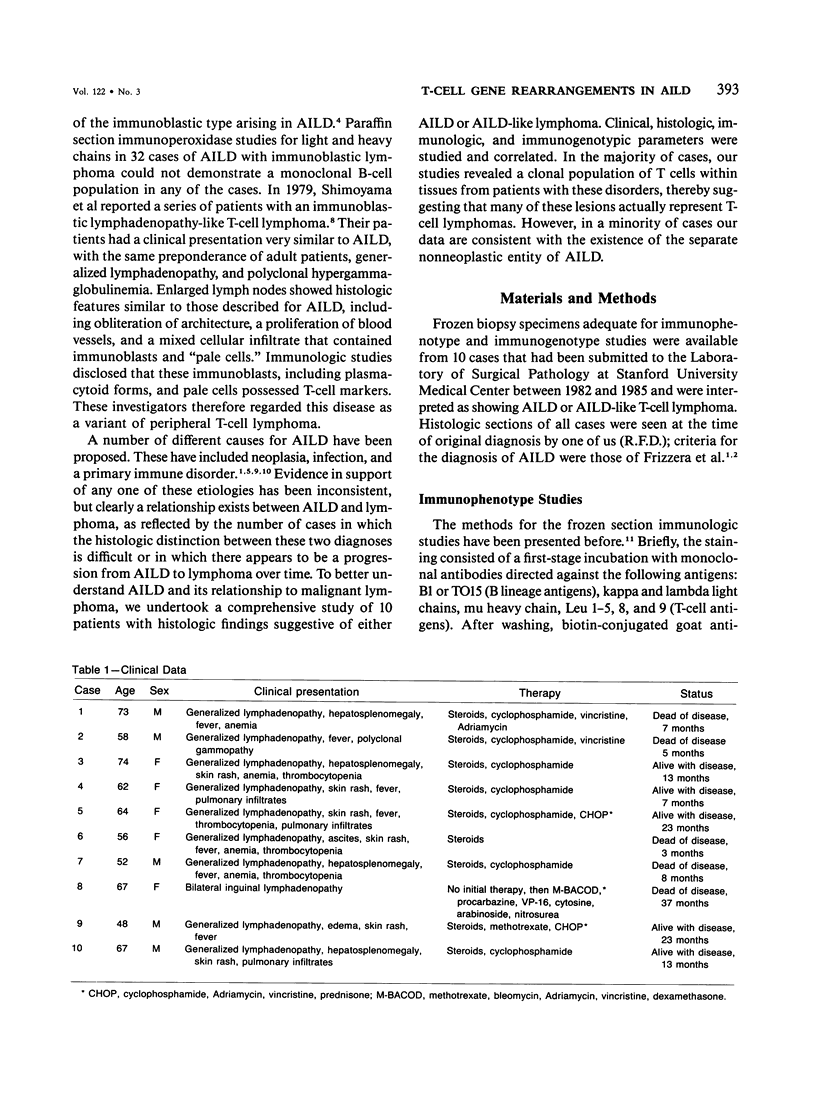
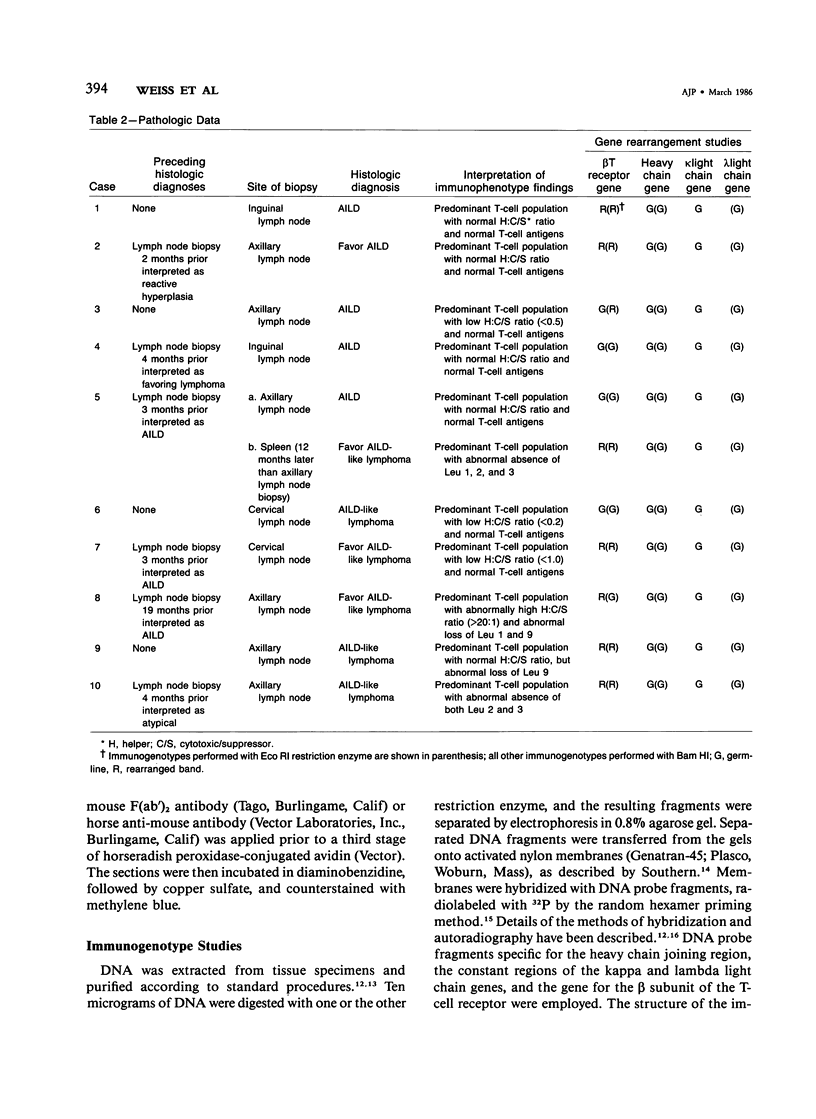
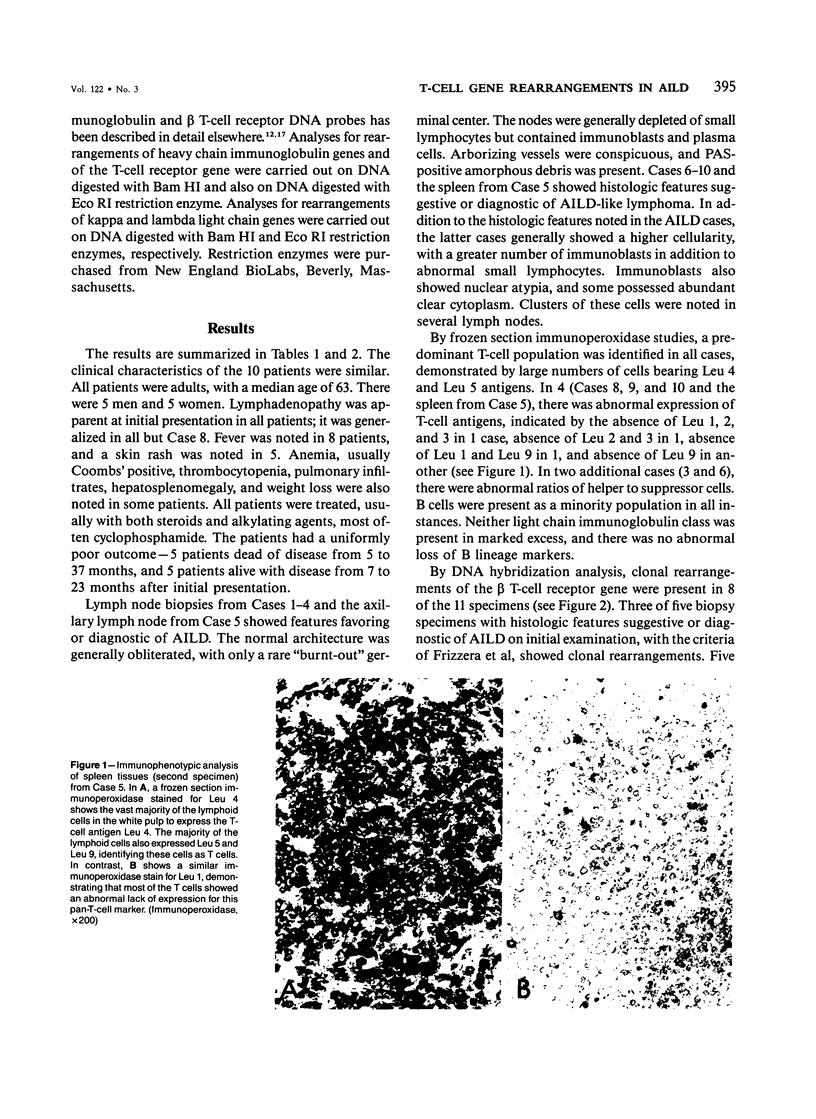
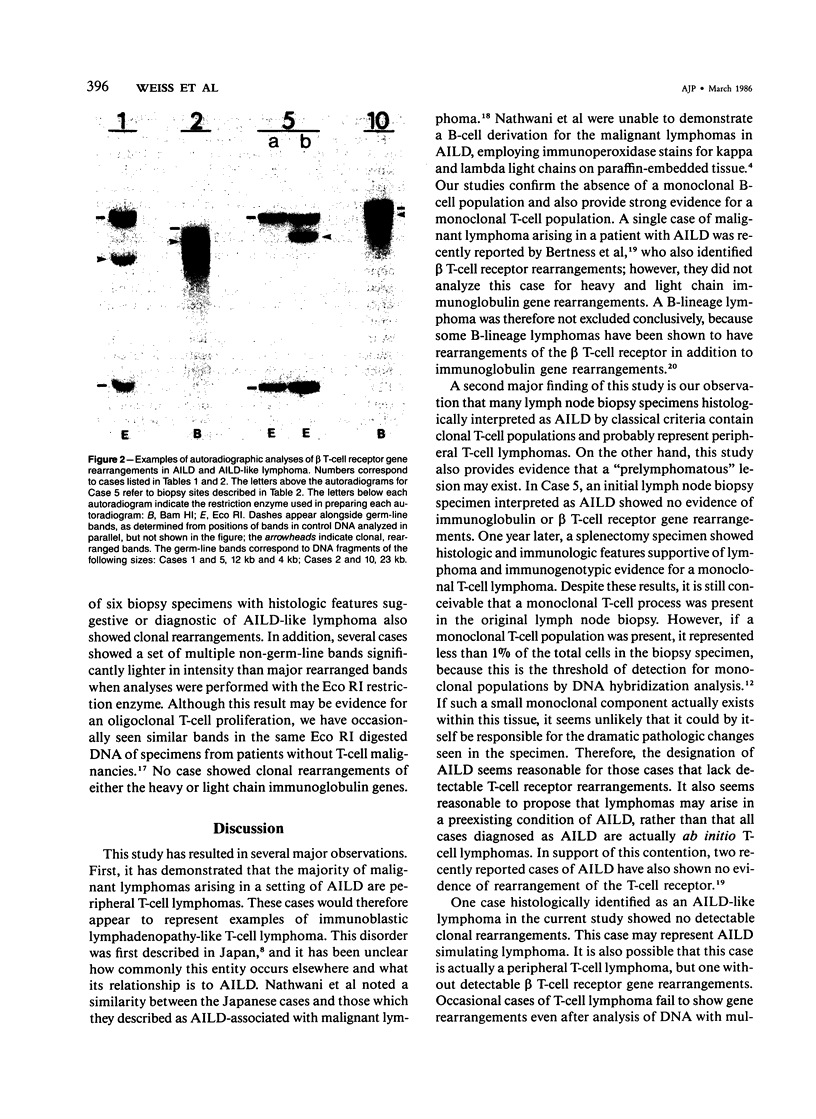
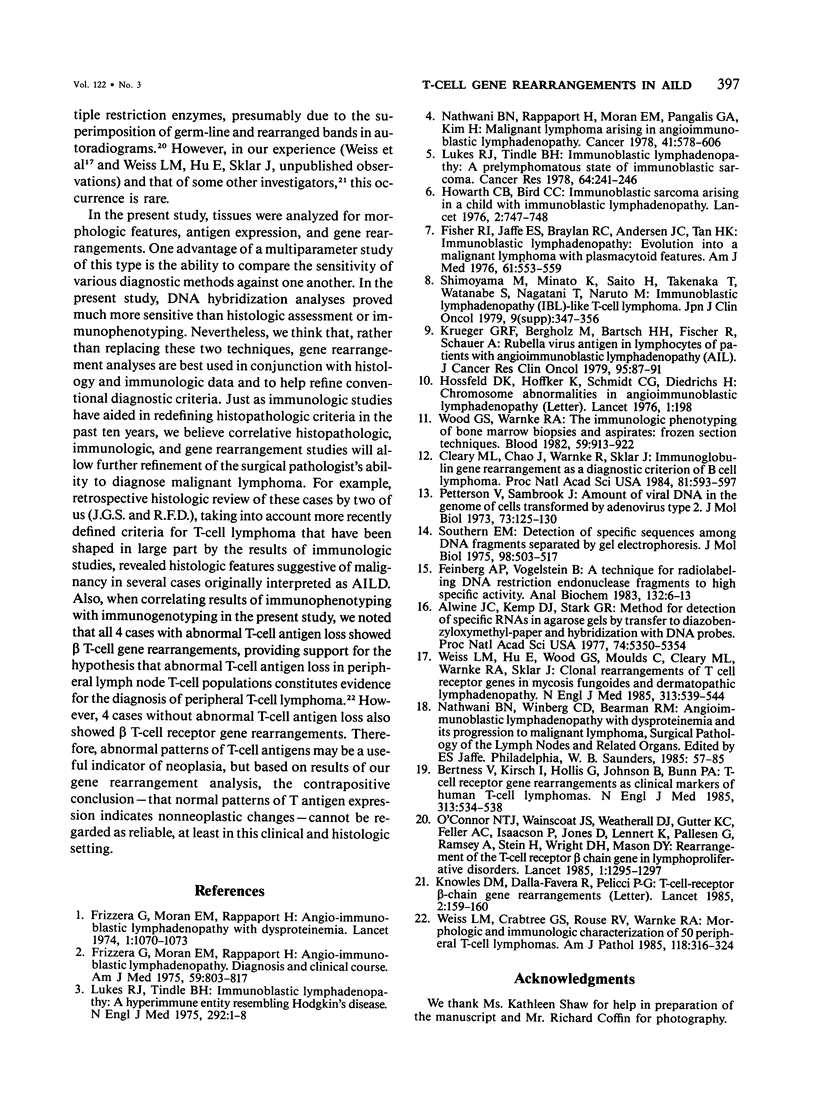
Images in this article
Selected References
These references are in PubMed. This may not be the complete list of references from this article.
- Alwine J. C., Kemp D. J., Stark G. R. Method for detection of specific RNAs in agarose gels by transfer to diazobenzyloxymethyl-paper and hybridization with DNA probes. Proc Natl Acad Sci U S A. 1977 Dec;74(12):5350–5354. doi: 10.1073/pnas.74.12.5350. [DOI] [PMC free article] [PubMed] [Google Scholar]
- Bertness V., Kirsch I., Hollis G., Johnson B., Bunn P. A., Jr T-cell receptor gene rearrangements as clinical markers of human T-cell lymphomas. N Engl J Med. 1985 Aug 29;313(9):534–538. doi: 10.1056/NEJM198508293130902. [DOI] [PubMed] [Google Scholar]
- Cleary M. L., Chao J., Warnke R., Sklar J. Immunoglobulin gene rearrangement as a diagnostic criterion of B-cell lymphoma. Proc Natl Acad Sci U S A. 1984 Jan;81(2):593–597. doi: 10.1073/pnas.81.2.593. [DOI] [PMC free article] [PubMed] [Google Scholar]
- Feinberg A. P., Vogelstein B. A technique for radiolabeling DNA restriction endonuclease fragments to high specific activity. Anal Biochem. 1983 Jul 1;132(1):6–13. doi: 10.1016/0003-2697(83)90418-9. [DOI] [PubMed] [Google Scholar]
- Fisher R. I., Jaffe E. S., Braylan R. C., Andersen J. C., Tan H. K. Immunoblastic lymphadenopathy. Evolution into a malignant lymphoma with plasmacytoid features. Am J Med. 1976 Oct;61(4):553–559. doi: 10.1016/0002-9343(76)90337-5. [DOI] [PubMed] [Google Scholar]
- Frizzera G., Moran E. M., Rappaport H. Angio-immunoblastic lymphadenopathy with dysproteinaemia. Lancet. 1974 Jun 1;1(7866):1070–1073. doi: 10.1016/s0140-6736(74)90553-4. [DOI] [PubMed] [Google Scholar]
- Frizzera G., Moran E. M., Rappaport H. Angio-immunoblastic lymphadenopathy. Diagnosis and clinical course. Am J Med. 1975 Dec;59(6):803–818. doi: 10.1016/0002-9343(75)90466-0. [DOI] [PubMed] [Google Scholar]
- Hossfeld D. K., Höffken K., Schmidt C. G., Diedrichs H. Letter: Chromosome abnormalities in angioimmunoblastic lymphadenopathy. Lancet. 1976 Jan 24;1(7952):198–198. doi: 10.1016/s0140-6736(76)91308-8. [DOI] [PubMed] [Google Scholar]
- Howarth C. B., Bird C. C. Immunoblastic sarcoma arising in child with immunoblastic lymphadenopathy. Lancet. 1976 Oct 2;2(7988):747–748. doi: 10.1016/s0140-6736(76)90049-0. [DOI] [PubMed] [Google Scholar]
- Knowles D. M., Dalla-Favera R., Pelicci P. G. T-cell-receptor beta-chain gene rearrangements. Lancet. 1985 Jul 20;2(8447):159–160. doi: 10.1016/s0140-6736(85)90267-3. [DOI] [PubMed] [Google Scholar]
- Krueger G. R., Bergholz M., Bartsch H. H., Fischer R., Schauer A. Rubella virus antigen in lymphocytes of patients with angioimmunoblastic lymphadenopathy (AIL). J Cancer Res Clin Oncol. 1979 Sep;95(1):87–91. doi: 10.1007/BF00411114. [DOI] [PubMed] [Google Scholar]
- Lukes R. J., Tindle B. H. Immunoblastic lymphadenopathy. A hyperimmune entity resembling Hodgkin's disease. N Engl J Med. 1975 Jan 2;292(1):1–8. doi: 10.1056/NEJM197501022920101. [DOI] [PubMed] [Google Scholar]
- Lukes R. J., Tindle B. H. Immunoblastic lymphadenopathy: a prelymphomatous state of immunoblastic sarcoma. Recent Results Cancer Res. 1978;64:241–246. doi: 10.1007/978-3-642-81246-0_28. [DOI] [PubMed] [Google Scholar]
- Nathwani B. N., Rappaport H., Moran E. M., Pangalis G. A., Kim H. Malignant lymphoma arising in angioimmunoblastic lymphadenopathy. Cancer. 1978 Feb;41(2):578–606. doi: 10.1002/1097-0142(197802)41:2<578::aid-cncr2820410226>3.0.co;2-8. [DOI] [PubMed] [Google Scholar]
- O'Connor N. T., Wainscoat J. S., Weatherall D. J., Gatter K. C., Feller A. C., Isaacson P., Jones D., Lennert K., Pallesen G., Ramsey A. Rearrangement of the T-cell-receptor beta-chain gene in the diagnosis of lymphoproliferative disorders. Lancet. 1985 Jun 8;1(8441):1295–1297. doi: 10.1016/s0140-6736(85)92791-6. [DOI] [PubMed] [Google Scholar]
- Pettersson U., Sambrook J. Amount of viral DNA in the genome of cells transformed by adenovirus type 2. J Mol Biol. 1973 Jan;73(1):125–130. doi: 10.1016/0022-2836(73)90164-2. [DOI] [PubMed] [Google Scholar]
- Southern E. M. Detection of specific sequences among DNA fragments separated by gel electrophoresis. J Mol Biol. 1975 Nov 5;98(3):503–517. doi: 10.1016/s0022-2836(75)80083-0. [DOI] [PubMed] [Google Scholar]
- Weiss L. M., Crabtree G. S., Rouse R. V., Warnke R. A. Morphologic and immunologic characterization of 50 peripheral T-cell lymphomas. Am J Pathol. 1985 Feb;118(2):316–324. [PMC free article] [PubMed] [Google Scholar]
- Weiss L. M., Hu E., Wood G. S., Moulds C., Cleary M. L., Warnke R., Sklar J. Clonal rearrangements of T-cell receptor genes in mycosis fungoides and dermatopathic lymphadenopathy. N Engl J Med. 1985 Aug 29;313(9):539–544. doi: 10.1056/NEJM198508293130903. [DOI] [PubMed] [Google Scholar]
- Wood G. S., Warnke R. A. The immunologic phenotyping of bone marrow biopsies and aspirates: frozen section techniques. Blood. 1982 May;59(5):913–922. [PubMed] [Google Scholar]




